Facilitator: Karl Cranswick, Solve Expert: Ian Robinson, FSL
Headlines:
- Many wealth management firms are dissatisfied with their current technology stacks, with only 25% of financial advisers satisfied with their solutions
- ESG data provision and compliance with upcoming regulations like the Sustainable Disclosure Requirement (SDR) are becoming critical concerns for wealth managers
- Wealth managers face important decisions on whether to build in-house technology, buy from vendors, or collaborate with other firms, with an emphasis on flexibility and understanding business requirements
- Data quality and integration continue to be significant challenges, with an increasing shift towards component-based solutions and ecosystems
- Security, privacy, and regulatory compliance are key factors in technology decision-making, particularly as AI and data-driven solutions become more prevalent
Discussion points:
Introduction to Financial Software and CGiX
The ongoing challenges faced by wealth management firms with their current technology stacks was highlighted, with only 25% of financial advisers satisfied with their tech solutions. The pressure to reduce costs and provide services to smaller portfolios was also emphasised, with the need for more democratised and effective wealth management technology emphasised.
ESG Data Provision and the Sustainable Disclosure Requirement (SDR)
The inefficiencies caused by legacy firms in ESG ratings and data provision and the upcoming SDR’s potential impact on wealth management firms, requiring the need for wealth managers to adapt their practices and tech systems to comply with SDR.
Build, Buy, or Collaborate Decision-Making
The group discussed the critical decision wealth management firms face when selecting technology solutions: build in-house, buy from vendors, or collaborate with other firms. Delegates shared their experiences with various approaches, highlighting the need to deeply understand business requirements before making a decision. CRM implementation challenges were discussed, along with the complexities of scaling systems as client needs evolve.
Data Quality and Integration Challenges
A major discussion point was the ongoing challenge of data quality and integration. Delegates emphasised the importance of standardised interfaces and data transfer methods to overcome barriers in moving between platforms. The need for better data extraction and cleaning solutions was identified as a top priority for wealth management firms looking to optimise their technology stacks.
Future Trends in Wealth Management Technology
The conversation turned toward future trends in wealth management technology, particularly the shift toward component-based solutions and ecosystems. The discussion highlighted the growing importance of integration capabilities, as firms seek to adopt modular solutions that can be easily integrated into existing tech stacks. This shift is expected to enable more flexibility and scalability in meeting clients’ needs.
Security, Privacy, and Regulatory Compliance
Security, privacy, and regulatory compliance emerged as critical factors when evaluating technology solutions for wealth management. Delegates emphasised the need for strong data protection measures and transparency in AI systems. With increasing use of AI and data-driven solutions, ensuring compliance with regulations like GDPR is vital for protecting client data and maintaining trust.
Key takeaways:
- Wealth managers should review their current technology stacks and consider whether component-based solutions can better meet their needs
- ESG data provision is becoming a significant priority for wealth management firms, with the upcoming SDR necessitating adjustments in technology and data management practices
- The decision to build, buy, or collaborate on technology solutions should be based on a deep understanding of business requirements and the flexibility of available options
- Improving data quality and integration capabilities should be a focus for both wealth management firms and technology providers
- The trend toward component-based solutions and ecosystems offers flexibility and scalability, and firms should prioritise integration capabilities when selecting technology
- Security, privacy, and regulatory compliance must be considered when adopting new technologies, especially AI and data-driven solutions


